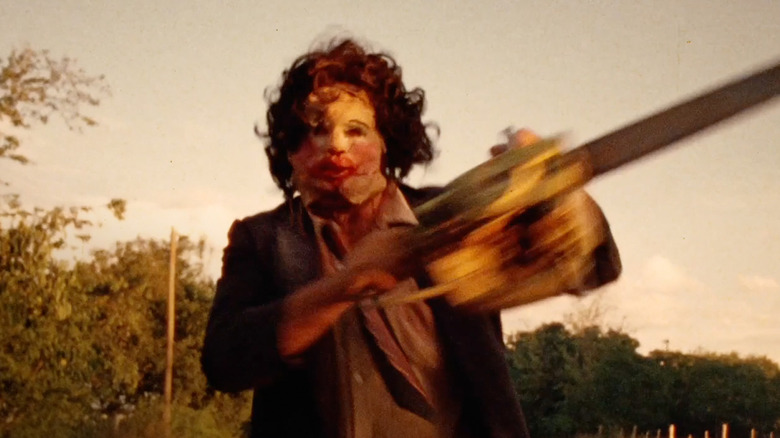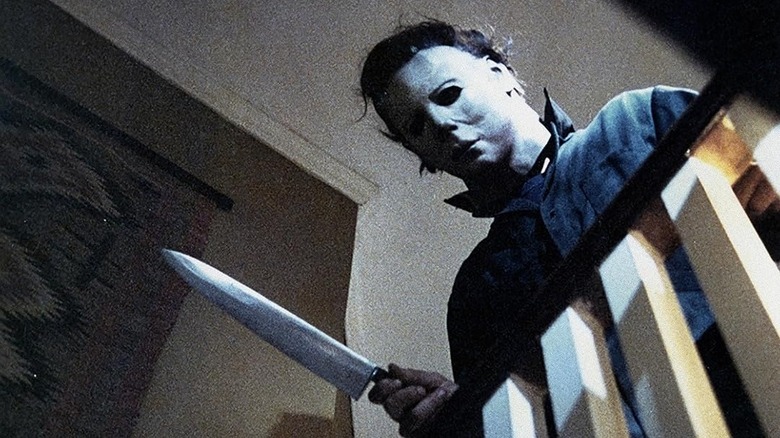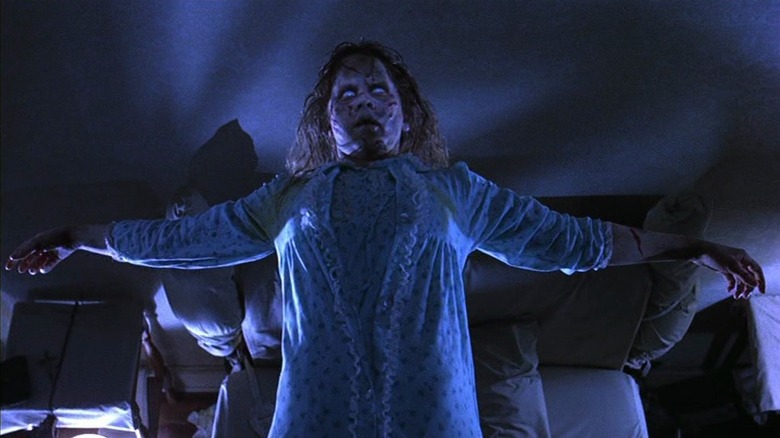The '70s Redefined The Horror Genre For Better And Forever
For almost as long as movies have been a thing, horror movies have been a thing. Dating back to the earliest classics of the genre, such as director F.W. Murnau's 1922 vampire masterwork "Nosferatu," things that go bump in the night have been a staple of the silver screen. But in the 1970s, things changed as horror went mainstream in a way it never had before. Between an emerging group of filmmakers who would make their stamp on the genre, dozens of enduring classics arriving, and a dramatic shift in the way the genre was approached, the '70s changed horror forever and, quite arguably, for the better.
Benefitting greatly from the New Hollywood movement that saw studios give free rein to independent-minded and radical filmmakers pushing the boundaries of the art form, '70s horror saw a group of directors influencing horror who, in many ways, were the first ones to grow up on popular horror of yesteryear. They had reverence for the genre but also wanted to do something new with it.
Popular horror arguably started with the Universal Monsters, and filmmakers like John Carpenter ("Halloween"), Tobe Hooper ("The Texas Chain Saw Massacre"), and Joe Dante ("Piranha") came of age watching them on TV. As they too got their chances to showcase their skills behind the camera, they had something to say using horror as the vehicle to do precisely that.
"I think it was a huge transition from the old horror — (Boris) Karloff, Vincent Price and the old monster movies — to the kind of new brand of scares that you saw in 'Rosemary's Baby,' 'Alien,' and 'Halloween,'" Jason Zinoman, author of "Shock Value: How a Few Eccentric Outsiders Gave Us Nightmares, Conquered Hollywood, and Invented Modern Horror," said of '70s horror to NPR in 2011.
Modern horror traces much of its DNA directly to the '70s
"It became much more realistic," Zinoman added. "Horror moved from being very remote about a spooky house in Transylvania to [a story] about the prom queen in your local high school." Zinoman is referencing director Brian De Palma's 1976 picture "Carrie," the first big-screen adaptation of Stephen King's work. That, in itself, is a huge deal as King is one of our unquestioned masters of horror. That's but one example. Many of the greatest, most influential horror movies ever made were released in the '70s. Their influence is still felt to this day.
There's Philip Kaufman's "Invasion of the Body Snatchers," a harrowingly dark vision that improved upon the original 1956 version in many ways. Horror remakes remain a huge business, which rose to prominence during this decade. Or take Steven Spielberg, one of the greatest directors in history, who got his start in horror. From his made-for-TV masterwork "Duel" to "Jaws," which literally invented the blockbuster as we know it, his influence on cinema is undeniable. It's rooted in '70s horror.
Then there's John Carpenter, a man literally known as The Horror Master. He gave us 1978's "Halloween" and, though it didn't invent the slasher (that honor many believe belongs to Bob Clark's "Black Christmas" from 1974), it arguably perfected it. The movie gave us Michael Myers and the notion of the enduring slasher icon who could return in endless sequels. "Friday the 13th" and countless other franchises would run a similar playbook in the ensuing years.
Let's also not forget William Friedkin's "The Exorcist," arguably the most respected horror movie of all time. Not only was it a smash hit, but it proved that horror could be taken seriously, something the genre still struggles with today.
Much of what we love about horror emerged in the '70s
We could spend days upon days singling out horror movies from this decade. One could write an entire book on Tobe Hooper's seminal, gory indie classic "The Texas Chain Saw Massacre." More than just an all-time great genre flick, it stands as a testament to what indie filmmaking can accomplish. The list goes on.
'70s horror clearly marked a turning point for the genre. So many of the voices that made the genre what it is emerged in this decade. So many of the on-screen icons of the genre that are still being made use of today were birthed during this time. Horror no longer had to be safe. You could make something as suspenseful and inventive as Ridley Scott's "Alien" or something as transgressive as Wes Craven's "Last House on the Left." Horror could now be anything.
Try to imagine modern horror without Michael Myers, Leatherface, Xenomorphs, or Bruce the shark. Try to imagine zombie movies in a world without "Dawn of the Dead." Would there be a Conjuring Universe without movies like "The Amityville Horror" that came before it? So much of what the genre has provided us over the last 50 years can be traced back to something that happened in the '70s.
Granted, franchise obsession can go too far, and the notion of a never-ending horror franchise stems from a lot of '70s hits. Do we really need another "Halloween" movie? At the same time, fans love it. It's part of what's special about horror. Any perceived negative effects from this decade on the genre are far outweighed by the positives.
In short, horror wouldn't be horror as we know it without the bold, indispensable canon of films provided to the genre in the '70s.


